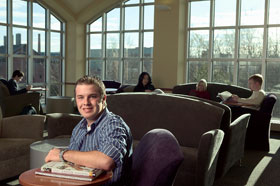  |
| HOME | THIS ISSUE | CALENDAR | GRANTS | BACK ISSUES | < BACK | NEXT > |
Honors Program a draw for high-achieving students by Richard Veilleux
- December 5, 2005
|
||||
|
UConn’s Honors Program, long a point of pride for the University, has seen some marked improvements during the past several years. A growing number of students, with increasingly better academic qualifications, compete for spots. More faculty are serving as honors advisors. The curriculum is becoming more challenging. New programs are being added. And some excellent universities are being passed over by students choosing UConn for its Honors Program. “Honors at UConn goes a long way in reversing Connecticut’s brain drain by helping the University attract the state’s brightest and most talented students,” says Lynne Goodstein, director of the Honors Program and associate vice provost for enrichment programs, who came to UConn three years ago. “The word is out that high-achieving students can get everything they want in a collegiate experience – challenging classes, individualized attention from faculty, opportunities for experiential learning, and a tight-knit community – right here at UConn. We’re also bringing in some remarkable students from across the nation.” The profile of students enrolled in the Honors Program has improved regularly since 2000. The average SAT for freshmen entering the program this year is 1400, up 18 points compared with last year, an increase of 67 points since 2000. All 266 incoming freshmen who were admitted to the Honors Program this academic year were among the best students in their high school classes. In the past three years, combined, the average honors student ranked in the top 4 percent of his or her high school class. Many are valedictorians or salutatorians, and others have earned distinctions in areas such as music, the sciences, or writing. The percentage of minorities participating in the honors program – 15.9 percent – is only slightly less than the percentage in the general student population. And honors students are choosing UConn over such schools as Johns Hopkins, Purdue, Smith, Trinity, Wellesley, Wesleyan, and the University of Wisconsin. “The Honors Program at UConn provides the benefits of a small community within the power and reach of a large research university,” says Chintan Bhatt, an engineering major who chose UConn over Purdue, the University of Illinois, and several other top engineering schools. Bhatt is now studying at the National University of Singapore through the Study Abroad program. Many of the 1,200 honors students enrolled this year are involved in extracurricular activities and clubs, including Sarah Domoff, president of the Undergraduate Student Government; Aaron Burton, who was selected for the student seat on the University Senate’s executive committee; and Ryan Notti, coordinator of community service through the Office of Community Outreach. Twenty-four honors students play varsity sports, and several dozen play in the Marching Band. Several new initiatives have been put in place during the past few years. Starting this year, Shippee Residence Hall became a “living and learning community” for most first-year honors students. Honors students have the opportunity to live in the honors residence hall in South Campus when they become upper-classmen. Research opportunities that usually are afforded only to graduate students are available through the Office of Undergraduate Research. Honors students have closer contact with professors and opportunities to participate in small classes.
The Honors Program also provides opportunities for learning beyond the classroom through internship and study abroad opportunities crafted for high-achieving students. And an Office of National Scholarships has been established, to help students apply for prestigious scholarships. “It was fascinating to speak with professors one-on-one,” says Sarah Breckenridge, an honors student for four years who is now pursuing a doctorate in English at Penn State. She hopes to have an academic career. Sarah Sokoloski, a junior majoring in Spanish and communications disorders, agrees that working closely with faculty is a plus. In a new Honors First Year Experience program, with classes kept to no more than 16 students, the students have an opportunity to meet and work with professors on a regular basis. The Honors FYE classes meet twice a week – once for a regular FYE class facilitated by another honors student, the other time for a course taught by a faculty member that focuses, casually and with a lot of discussion, on the professor’s research or other interests. The research opportunities are a draw for many of the students who enroll in the program. Many work closely with faculty to complete honors theses and become honors scholars. Many start much earlier, in their freshman year, and become part of a research team. “In high school, I found most of my classes to be very easy. I didn’t have to study to get A’s. Here, the honors courses offer challenges that others may not,” says Sokoloski, from Eastford. Goodstein, the director, says the academic offerings for honors students will continue to grow. “The program has come a long way in the past few years,” she says. “We’re moving very quickly in building an even more powerful curriculum.” An honors core of general education classes is being developed, with interdisciplinary courses centered on a theme. The classes, which will begin next fall, are designed for honors students to fulfill their general education requirements. Within several years, all honors students will be exposed to at least one interdisciplinary honors course. Goodstein says work has also begun to enhance the curriculum overall, which will be necessary to continue challenging new honors students. |
| ADVANCE HOME |

